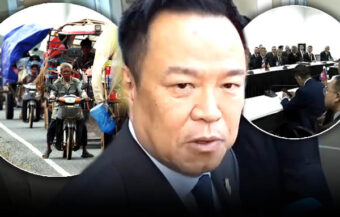Pheu Thai pushes a bold reverse tax plan as 60.8M residents and 600K businesses must file returns, allowing low-income households to receive payments, aiming to tackle Thailand’s black economy, boost fiscal accountability and counter rising inequality.
The embattled Pheu Thai government is pressing ahead with economic reform, even as the Shinawatras face critical court cases from August 29 to September 9. On August 1, the U.S. confirmed a 19% tariff, a rare win for Thailand’s battered economy. Despite a 6.9% drop in tourist arrivals so far this year, growth is still targeted at 2.3%, buoyed by strong exports in the first half of the year. This week, the Finance Ministry announced a groundbreaking reverse tax system to tackle the black economy. Some 60.8 million residents and 600,000 businesses must file tax returns, while low-income households will receive payments to offset taxes. The move could transform fiscal accountability and crack down on unreported income nationwide.

Bangkok, August 15, 2025 — Thailand is preparing to launch one of the most comprehensive tax overhauls in its modern history. Despite political instability, a border crisis with Cambodia and fallout from the new US tariff regime, the Pheu Thai-led government is pressing ahead with reforms aimed at reshaping the country’s economic foundations.
At the centre of the plan is a mandatory filing system requiring all adult citizens and businesses to submit annual tax returns by 2027. Foreign residents will also be included. Officials say the move will create a complete picture of incomes nationwide, strengthen fiscal discipline and expand the narrow tax base.
Thailand will require annual tax returns for all citizens and businesses by 2027 to expand revenues
Currently, only about four million people pay income tax in a country of 70 million. Former Prime Minister Srettha Thavisin has repeatedly called this imbalance unsustainable.
On Friday, he renewed his plea on X, saying the government cannot shoulder the burden alone. “The budget is limited, but our hearts are unlimited,” he wrote, urging those with resources to help those without. He called for a culture of giving, through taxes, direct assistance or community support.
Significantly, the overhaul introduces a “reverse tax” or negative income tax system. Those earning above a set threshold will pay taxes as usual, while those below it will receive direct financial support.
This is not a European-style welfare system, but a targeted approach that rewards transparency while assisting low-income earners. Officials believe it could transform the economy and attitudes toward accountability.
To make the system work, the Ministry of Finance is building an extensive “data lake” to consolidate records from multiple agencies. This includes tax filings, customs declarations, business registrations, and public health data.
By integrating the Revenue, Customs, and Excise departments, the government expects to detect under-reporting and increase collections without raising official rates. Reduced import duties that boost corporate profits could be offset by corporate income tax adjustments.
Ministry of Finance to consolidate tax, customs and public health data to strengthen compliance nationwide
Moreover, the ministry already has data on 60.8 million individuals and 600,000 businesses. This foundation will support the planned Ari Score, a public credit rating system to improve welfare program targeting. Citizens must register for the tax system to be eligible for benefits, ensuring payments are linked to verified income.
The reforms aim to strike at the heart of Thailand’s vast informal economy, which accounts for up to half of all business activity. By requiring full income declaration, the government hopes to reduce cash-based transactions, bring more economic activity into the formal sector and raise state revenue for infrastructure, education and healthcare.
Furthermore, the changes come amid growing fiscal strain. Government revenues are falling, and this year marks the first in recent memory without a budget increase. In recent years, shortfalls have been covered by borrowing through state-owned banks, a practice critics warn is unsustainable.
Economic challenges are compounding the urgency. Thailand’s manufacturing base is heavily dependent on Chinese imports, weakening domestic industry and reducing customs revenue.
At the same time, tourism, a vital source of foreign income, is struggling. Arrivals are down 7% this year, and bad debts are mounting even in the hospitality sector, once a dependable growth engine.
Data on 60 million citizens and 600,000 businesses underpins new Ari Score for welfare programs
Bad debt is also rising in other areas, with medium and large businesses increasingly unable to meet loan obligations. This trend threatens both the banking system and government finances. As a result, the Ministry of Finance emphasises that meeting revenue targets must be a top priority.
Nevertheless, some economists caution that implementing a nationwide filing requirement could be challenging. In rural areas, incomes are often seasonal, informal and difficult to document. Aggressive enforcement could place undue strain on small farmers and vendors.
However, supporters argue the reform is overdue. They contend a broader tax base will stabilise public finances, reduce the need for debt, and provide resources for strategic investment. International experience with negative income tax models shows they can simplify welfare administration, reduce fraud and encourage formal economic participation.
The government is also working to link its financial and public health data. This collaboration will provide policymakers with accurate insights to manage welfare efficiently. It is a major step toward understanding regional disparities in income and quality of life.
Rising bad debts and rural challenges highlight urgency of tax reform and better public financial management
Former Prime Minister Settha emphasised the widening economic gap, warning that relying solely on four million taxpayers is insufficient. He urged everyone capable of helping to do so. “If you have a little, give a little. If you have a lot, give a lot. Even if you have nothing today, share when you can,” he said.
Officials stress that the reforms are not merely about taxation. They are about accountability, transparency and long-term economic stability. Without decisive action, the informal economy could continue to undermine government revenues.
Moreover, by requiring comprehensive filing, officials hope to identify loopholes and enforce compliance more effectively. Linking data across multiple departments will allow authorities to spot mismatches between reported income, imports and corporate profits. Such measures aim to ensure fairness and increase public trust in fiscal policy.
At the same time, the government must navigate a delicate balance. Overly aggressive enforcement could alienate citizens and small businesses, especially in rural areas where cash-based trade dominates. Therefore, the Ministry of Finance plans a gradual implementation, supported by public awareness campaigns and technical assistance.
Officials emphasise fairness, transparency and gradual enforcement to build trust in new tax compliance
Furthermore, the negative income tax will provide relief for those below the income threshold. These individuals will receive targeted welfare benefits, ensuring the reform is not merely punitive. Officials believe that this dual approach—tax collection for the wealthy and support for the poor—will create a fairer, more sustainable economy.
Thailand’s challenges extend beyond taxation. Manufacturing faces stiff competition from China, while tourism recovery remains slower than expected. Even in regions historically considered economic growth engines, bad debts are rising and businesses struggle to remain solvent. Consequently, the government views fiscal reform as urgent and unavoidable.
Significantly, officials hope the reforms will help Thailand modernise its economy. They aim to reduce reliance on informal cash transactions, formalise business activity and expand the tax base. This, in turn, should provide funding for critical social programs, infrastructure and healthcare.
Negative income tax and fiscal reforms aim to modernise Thailand’s economy and fund social programs
Moreover, public health data integration will allow targeted interventions. For instance, officials can identify regions where income and health outcomes correlate, ensuring welfare benefits reach those most in need. Such insights are expected to improve policy efficiency and transparency.
Former Prime Minister Settha’s public statements reflect the moral imperative behind the reforms. He has repeatedly highlighted the stark economic disparity and urged those capable of helping to act. The goal is collective responsibility, ensuring that the country’s growth is equitable and sustainable.
OECD tax changes and other moves at the heart of growing rifts appearing in Thailand’s government
55% of Foreign Expats thought of moving out of Thailand in 2024. Majority will not file tax returns
Expert warns foreign tourism has become Thailand’s curse, fueling inertia and a widespread malaise
Undoubtedly, Thailand’s planned tax and welfare reforms represent a bold attempt to modernise an economy long dominated by informal practices. By integrating comprehensive tax filing, a negative income tax and linked data systems, the government hopes to reduce inequality, expand fiscal capacity and create a more accountable system. While challenges remain, officials insist that these measures are essential for long-term stability, growth and fairness.
Join the Thai News forum, follow Thai Examiner on Facebook here
Receive all our stories as they come out on Telegram here
Follow Thai Examiner here
Further reading:
Expert warns foreign tourism has become Thailand’s curse, fueling inertia and a widespread malaise
Thaksin does not rule out joining talks in US as Thai team finalises plans. They fly out on Thursday


















